- HOME
- ABOUT ME
- movies
- MEDIA
- L.Onerva
- Eino Leino
- Eeva-Liisa Manner
- Erään Opon päiväkirja
- Elämänkenttäni
- Elämäni ”viiva”
- Käyttöteoriani – se miten minä ohjaan
- Kulttuuritietoinen ja kansainvälistyvä ohjaus
- Ohjauksen järjestäminen maahanmuuttajakoulutuksessa
- Ohjauksen yhteiskunnallinen viitekehys
- Ohjaukäsite
- Oma opiskeluorientaatio
- Opiskelijoiden yksilöllisyys ohjauksessa
- EETTISET KYSYMYKSET
- Psykososiaalisen kehityksen teoria
- Suhteeni erilaisuuteen ja tehtäväni opinto-ohjaajana
- Opinto-ohjauksen ja erityisopetuksen yhtäläisyyksiä ja eroja
- Kehitykseni opinto-ohjaajana
- Maahanmuuttajan uraohjaus
- Maahanmuuttajien ohjaus ja neuvonta: kuka, mitä, miten?
- Ohjauksen tulevaisuus
- Elämänkenttäni
- Mariana Marin
- Claudiu Komartin
- Mariana Codrut
- Roland Erb
- Romanian poetry
- ESSAYS
- STORIES
- CLASSIC POETRY
- CONTEMPORARY POETRY
- TRANSLATED POEMS
- READING POETRY
- CONTACT
- translated Italian-English
- translated Italian-Romanian
- translated Spanish-English
- translated Spanish-Romanian
June, 2023
CASTELUL DE APA / THE WATER CASTLE
POSTED IN Mariana June 28, 2023
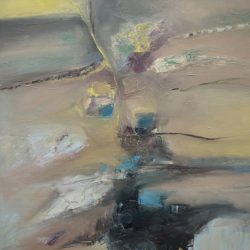
CASTELUL DE APA / THE WATER CASTLEUn război de o sută de ani
la întretăierea drumurilor comerciale,
– știam ce m-așteaptă!
Iată-mă deci
rotind ușor mașinăria privirii bolnave
spre întortocheatele sunete
care îmi desăvârșesc graiul celest.
Să povestesc oare despre inutilitatea rememorării
în cumplita tinerețe de mijloc a faptelor?
Sau (mai bine) despre drumul meu însingurat
prin pâcla elementelor dintr-o dimineață de iarnă?
Să opresc ficțiunea pe treptele castelului de apă
de la sfârșitul a două războaie,
crenelat ca o memorie previzibilă
și duios, aidoma ei?
Sau (mai bine) să pornesc mașinăria privirii
în catacombele contemporane
spre spaima și freamătul celor care mă citesc?Dar vine ochiul glumeț și mă bate pe umăr:
„Dulceață, aidoma ție s-au mai văzut!”Mai bine așa,
îngrijindu-te de însămânțările celeste
din preajma castelului de apă,
crenelat și duios
cu toate crimele de pe steaguri…Mariana MARIN
………………..A Hundred Years War
at the crossroads of trade routes,
– I knew what awaited me!
So here I am
gently turning the machinery of the sick gaze
towards the twisted sounds
that perfect my heavenly speech.
Shall I tell about the futility of reminiscing
in the terrible middle youth of facts?
Or (better yet) about my lonely way
through the fog of the elements on a winter morning?
Shall I stop the fiction on the steps of the water castle
at the end of two wars,
crenelated as a predictable memory
and tender, like her?
Or (better yet) turn on the gaze machine
in contemporary catacombs
to the fright and thrill of those who read me?But the funny eye comes and taps me on the shoulder:
“Sweetness, I’ve seen your kind before!”Better that way,
tending to the celestial seeds
around the water castle,
crenelated and tender
with all the crimes on the flags…
Under water castle, painting by Giedre ZUKAUSKAITE, UK
trad. M. M. Biela
ATELIERELE / THE WORKSHOPS
POSTED IN Mariana June 28, 2023
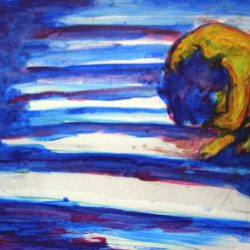
ATELIERELE / THE WORKSHOPS
(1980–1984)
Prietenilor
ELEGIE I / ELEGY INici nu mai știi
de ce îți este atât de greu să trăiești.
Așa cum în Evul Mediu tulburările minții
erau puse pe seama tulburărilor de stomac,
tot astfel cauți și tu cauza
(biet furuncul crezându-se revoluție)
în ceea ce pe dinăuntru îndesit mănâncă
fără să te poată atinge.Mariana MARIN
……………….
THE WORKSHOPS
(1980–1984)To friends
ELEGY IYou don’t even know anymore
why is it so hard for you to live
Just as in the Middle Ages disorders of the mind
were attributed to stomach disorders,
so do you also look for the cause
(poor boil thinking itself a revolution)
in what on the inside thickened eats
without being able to touch you.trad. M. M. Biela
INCREMENESC / I STAND STONE-STILL
POSTED IN Mariana June 28, 2023

INCREMENESC / I STAND STONE-STILL
Fotografia fetiței de 15 ani îmi arde ochii.
Din hârtia lucioasă ea surâde.
Voia să ajungă scriitoare. Era. Este.Acum ar fi avut 55 de ani.
Mi-ar fi putut fi mamă.Încremenesc.
Eu nu trăiesc în Olanda
și peste 40 de ani aș avea aproape 70.
Am vrut să ajung scriitoare. Sunt? Voi rămâne?
CEA-DE-ATUNCI ar putea trăi în orice țară a lumii.
Mi-ar putea fi fiică.
Nenorocitele mele de poeme i-ar putea salva o carte.
Sufletul.
Viața.
Încremenesc.
Mariana MARIN………………..
STAND STONE-STILL
The photo of the 15-year-old girl burns my eyes.
From the glossy paper she smiles.
She wanted to become a writer. She was. She is.She’d be 55 now.
She could have been my mother.I stand stone-still.
I don’t live in the Netherlands
and in 40 years I would be almost 70.
I wanted to become a writer. Am I? Will I remain?
THE ONE-BACK-THEN could live in any country in the world.
She could be my daughter.
My damn poems could save her a book.
The soul.
The life.
I stand stone-still.
trad. M. M. Biela
SINGURA, LINISTITA / ALONE, PEACEFUL
POSTED IN Mariana June 28, 2023
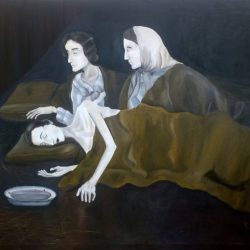
SINGURA, LINISTITA / ALONE, PEACEFULDa, nu-i mai cer acestei lumi decât liniștea.
Dar despre liniște cu gândul la tine
și cu vorbele tale, Anne.
Singure, fără a fi rostite cuiva.
Amintește-ți: „Război, frig, întuneric,
camuflajul ferestrelor și într-un târziu pacea
întorcându-se singură, liniștită, printre atâtea dezastre,
în orașul tău și în mansarda mea”.Și astfel ajung din nou la Anne Frank,
fetița de 15 ani
din Olanda ultimului război.Un citat din binecunoscutul ei Jurnal
sau o dedicație a întregii cărți
memoriei sale
și-ar avea rostul.Se știe doar că Anne Frank a murit acum 40 de ani
în lagărul de la Bergen-Belsen
cu două luni înainte ca Olanda să fie eliberată.
Mariana MARIN…………………..
ALONE, PEACEFUL
Yes, all I ask of this world is peace.
But about peace with the thought of you
and with your words, Anne.
Alone, without being spoken to anyone.
Remember: “War, cold, darkness,
windows’ camouflage and eventually peace
returning alone, peacefully, among so many disasters,
to your city and to my attic”.And so I come back to Anne Frank,
the 15-year-old girl
from Holland of the last war.A quote from her well-known Diary
or a dedication of the entire book
to her memory
would make sense.It is only known that Anne Frank died 40 years ago
in the Bergen-Belsen concentration camp
two months before Holland was liberated.trad. M. M. Biela
GLASUL ANNEI SUB NIVELUL MARII / ANNA’S VOICE BELOW SEA LEVEL
POSTED IN Mariana June 28, 2023

GLASUL ANNEI SUB NIVELUL MARII / ANNA’S VOICE BELOW SEA LEVEL
Fără nici un semn de la tine, viață,
am continuat să trăiesc
făcându-mi zestre
din ceea ce mai toți aruncau peste bord.
Încărcături de tot felul
adunate în memoria mea puternică.
A nu uita, a nu te uita
a devenit câinele casei noastre.
Dimineața bea lapte,
la prânz umblă în două picioare,
seara schelălăie după tine.
Și toate acestea cu un anume fel de demnitate
fără de care și-ar răni mereu câte un deget;
fără de care și eu aș putea să nu te mai am.
Gestul lor scurt – o răpăială de gloanțe
adunate în memoria mea puternică.
Mariana MARIN
………………..Anna’s voice below sea level
With no sign of you, life,
I went on living
making me a dowry
from what most everyone else threw overboard.
All kind of loads
gathered in my strong memory.
Remembering, remembering you
has become our house dog.
In the morning he drinks milk,
at noon he walks on two legs,
in the evening he whines after you.
And all with a certain kind of dignity
without which he would always hurt a finger;
without which I might not have you anymore.
Their brief gesture – a rattle of bullets
gathered in my strong memory.trad. M. M. Biela
NACHTLIED
POSTED IN Mariana June 28, 2023

NACHTLIEDMă gândesc uneori la copacii
pe care Mandelștam își scria poeziile
în ultimii ani de viață.
Oare cum s-au integrat ritmului lor vegetal
după moartea poetului? Ce fel de frunze au dat?
Și scrisul, scrisul acela, cum l-au păstrat
până azi, peste iarnă?Mariana MARIN
………………..Nachtlied
I sometimes think about the trees
on which Mandelstam wrote his poems
in the last years of his life.
How did they integrate their vegetal rhythm
after the poet’s death? What kind of leaves did they bear?
And the writing, that writing, how they keep it
until today, over the winter?trad. M. M. Biela
KADDISH
POSTED IN Radu Vancu June 20, 2023
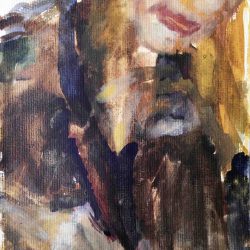
KADDISH(Poeme din volumul în curs de apariție la Casa de Editură Max Blecher)
Dragostea mea după ce mi‑ai scos corpul
din groapa
comună mi‑ai găsit în buzunarul din față al
hainei carnetul
cu ultimele poezii Era ud De la pământul
ud Dar și de la corpul
meu putrezit & îmbibat în hârtie L‑ai uscat
la soare Stăteai
lângă carnet & așteptai să se usuce ca să
vezi dacă se
pot citi poeziile M‑am gândit că te uitai la
corpul meu
cum se evaporă din carnet Cum se evaporă
din poezii Și era
un pic straniu că poeziile se vedeau numai
dacă se evapora
corpul meu din ele Era vară M‑am
evaporat repede & poeziile
au început să se vadă Le citeai & te
priveam în același timp din
aerul de deasupra unde mă evaporasem &
din groapa comună
unde rămăsesem & din poezii Nu ai plâns
Dar am plâns eu Te‑ai
uitat mirată cum carnetul se udă iar Ai
început să sufli peste
el Peste mine Cu cât suflai carnetul se uda
mai tare L‑ai pus
în buzunar M‑am evaporat de la căldura
corpului tău mult
mai repede decât de la soare Cum mă
evaporam uneori
de la soarele & moartea dulce care‑ți
răsăreau împreună
pe față la orgasm Când l‑ai scos peste nici
un minut perfect
uscat se vedea că nu înțelegi nimic Nici eu
nu înțeleg dragostea
mea Te privesc chiar acum din groapa
comună Sau poate din
poezii De fapt din amândouă Aerul din
jurul tău sunt eu Dacă
simți cum aerul & lumina se fac deodată
un fel de sare udă să
nu te sperii Sunt doar eu E doar poezie‑ ‑ ‑ ‑ ‑ ‑ ‑ ‑ ‑ ‑
(Doar pentru că lumina plânge de la ce
scriu
nu înseamnă că sunt viu)‑ ‑ ‑ ‑ ‑ ‑ ‑ ‑ ‑ ‑
Carolyn Forché & antologia ei din 1993,
Against Forgetting: vreo 150 de poeți din
secolul 20 cu poeme‑mărturie despre
ororile totalitare & genocidare; începe
cu genocidul armean & se încheie cu
războaiele din Iugoslavia.
Acolo l‑am descoperit pe Rádnoti Miklos
‑ cu carnetul în care și‑a notat ultimele
poeme găsit în buzunar după ce a fost
deshumat din groapa comună în care‑l
aruncaseră naziștii. Și în care numai
dragostea încăpățânată a soției lui, Fanni
Gyarmati, a reușit să‑l găsească. Hârtia
era deja îmbibată de zemurile propriului
corp descompus, au lăsat‑o să se usuce la
soare ‑ și au reapărut pe ea unele dintre
cele mai atroce & luminoase poeme
compuse vreodată de o ființă umană.
Rádnoti notase în poemele lui marșul
forțat al deținuților, execuțiile de pe
acel drum dinspre minele de cupru din
orașul sârb Bor înspre Ungaria (inclusiv
execuția prietenului lui, violonistul Lorsi
Miklós, împușcat în ceafă; „așa te vor
omorî și pe tine peste câteva zile”, notase
într‑un vers din ultima zi a lui octombrie
1944; exact așa a fost ‑ l‑au împușcat și
pe el în ceafă peste câteva zile), amintirile
cu Fanni (iluminate orbitor ‑ epifanii
în sensul cel mai tare, strict sacru, al
termenului).
Fanni a trăit încă 70 de ani, până în
februarie 2014. Nu s‑a mai căsătorit.
După moartea ei a apărut un jurnal de
1.300 de pagini, acoperind anii 1935‑46,
despre care nu vorbise nimănui în cei
70 de ani. A făcut și jurnalul ăsta să
apară din neant ‑ cum făcuse și poezia
să se întoarcă din mormânt. Ea e eroina
absolută a poemului ăstuia, a combinației
ăsteia de nekya & kaddish.
În hârtia poemelor lui Rádnoti, îmbibată de
carnea & creierul & inima lui, se îmbibase
de fapt tot umanul.
(Numai când hârtia se îmbibă de corpul
tău se cheamă că scrii cu adevărat.)
‑ ‑ ‑ ‑ ‑ ‑ ‑ ‑ ‑ ‑
Aș putea să nu‑mi aduc aminte de tine
dragostea mea dar
lucrurile simple nu merită făcute Simplă e
inima
care când moare a și murit Simplu e
creierul
care când se oprește chiar s‑a oprit
Dar groapa comună nu‑i niciodată simplă
Aici totul forfotește
până dincolo de sânge Ca‑n poezie Ca‑n
dragoste Tu
dintotdeauna ai fost groapa noastră
comună dragostea
mea Noi am trecut din prima secundă
dincolo de sânge‑ ‑ ‑ ‑ ‑ ‑ ‑ ‑ ‑ ‑
(Doar pentru că scriu poemele astea
nu înseamnă că sunt viu)
‑ ‑ ‑ ‑ ‑ ‑ ‑ ‑ ‑ ‑
Ce frumos răsar inimile peste groapa
noastră
comună zice Miklós Șșșt zic morții să nu le
speriem
Și ne uităm cum inimile alunecă pe
deasupra
ca niște pești de lumină Fir întins strigă
unul mai de la
margine Bă ce prost ești le‑ai speriat urlă
vecinul lui
Ba nu s‑au speriat boule Câteva inimi au
coborât și mai
aproape Morții freamătă ca orfanii la o
vizită de înfiere
O aud zice Miklós e Fanni a ta Inima ta ca
un somon
de lumină coboară printre morți și începe
să înoate
înspre mine
‑ ‑ ‑ ‑ ‑ ‑ ‑ ‑ ‑ ‑
Marii răniți ‑ care, la concertele date de
Enescu pentru ei pe front, se uneau câte
doi pentru a putea să‑l aplaude, atunci
când aveau câte o mână amputată.
Whitman ‑ care, în vremea Războiului
Civil, s‑a dus voluntar ca asistent
medical pentru marii răniți, pentru
marii mutilați, pentru muribunzii care
mai aveau de trăit doar câteva zile, poate
doar câteva ore. A vorbit & a condus
înspre moarte sute de oameni; și‑a folosit
cuvintele & limbajul, așa cum Enescu
și‑a folosit muzica, pentru a alina corpuri
& suflete aproape de distrugerea totală.
Enescu ‑ spunând undeva că a văzut fețele
marilor răniți anesteziate încă de la
primele note & că asta‑i ce face arta mai
prețios, aduce „transformarea în suflet”.
Am invidiat muzica citind asta: nu cred
că, în circumstanțele corpului distrus
aproape total, poezia poate anestezia
atât de rapid. Anestezicul ei e mai lent;
durează mai mult până când cuvintele se
dizolvă în sânge ‑ &, purtate de el, ajung
să se dizolve în creier ‑ &, în cele din
urmă, să dizolve creierul.
Poezia pansează ‑ dar fără anestezic.‑ ‑ ‑ ‑ ‑ ‑ ‑ ‑ ‑ ‑
Dragostea mea când carnea mea se topea &
se îmbiba
în carnețelul din buzunar știam că
niciodată nu te‑am
înșelat mai oribil Numai în carnea ta mai
intrasem
ca în hârtia asta Nu Invers Numai carnea ta
mai intrase
atât de adânc în mine Mă îmbibam & mă
așteptam ca
paginile să înceapă să cânte chiar acolo în
groapa
comună Cum cânta carnea mea după ce te
îmbibai în ea
Cum a cântat neîntrerupt de când te‑am
văzut în stația de
tramvai de lângă Keleti & până când
glonțul mi‑a intrat
în ceafă aici la Abda lângă Győr N‑ai să mă
crezi când
o să‑ți spun că și glonțul străbătând creierul
îmbibat de
tine a început să cânte Dar toată groapa
comună poate
depune mărturie că așa a fost Așa că‑i un
mic scandal
că paginile n‑au cântat aici jos printre oase
Cântecul
ne‑ar fi făcut să uităm că nu mai aveam
carne Cum ne
făcea înainte să uităm că avem carne La
vreo 2 luni după
ce m‑ai scos din groapă erai deja înapoi la
Budapesta pe
strada Pozsony în patul nostru Ai scos
carnetul din care
mă evaporasem & l‑ai pus lângă tine în pat
& l‑ai
deschis A început să cânte ca o cutiuță
muzicală Ai
rămas întinsă & l‑ai ascultat atentă cântând
neîntrerupt
de atunci din iunie 1946 până în februarie
2014 când
te‑ai ridicat din pat & ai închis carnetul &
ai coborât aici
lângă mine M‑ai îmbrățișat & am început
să ne îmbibăm
liniștiți unul în altul ca în pământ Ca în
hârtie Groapa
comună a început deodată să cânte ca o
cutiuță
muzicalăRadu VANCU
……………………
KADDISH(Poems from the forthcoming volume at Max Blecher Publishing House)
My love after you removed my body
from the common grave
you found in the front pocket of
my coat the notebook
with the last poems It was wet From the wet ground
But also from
my rotten & paper-soaked body
You dried it
in the sun You stood
next to the notebook & waited for it to dry
to see if the poems could be read
I thought you were watching
my body
evaporate from the notebook How it evaporates
from the poems And it was
a bit strange that the poems could only be seen
if my body evaporated
from them It was summer
I quickly evaporated & the poems
started to show You were reading them
& I was looking at you at the same time from
the air above where I had evaporated &
from the common grave
where I had remained & from the poems You didn’t cry
But I cried You
watched, surprised how the notebook got wet again You
started blowing over
it Over me The more you blew, the wetter the notebook got
You put it
in your pocket I evaporated from your body heat
much
faster than from the sun How I
sometimes evaporated
from the sun & sweet death
rising together
on your face at orgasm When you took it out
in less than a minute
perfectly dried it was clear that you do not understand anything
Neither do I
my love
I’m looking at you right now from the
common grave Or maybe from the
poems Actually from both The air
around you is me If you
feel that the air & light suddenly become
kind of wet salt
don’t be afraid It’s just me It’s just poetry
‑ ‑ ‑ ‑ ‑ ‑ ‑ ‑ ‑(Only because the light cries from what
I’m writing
doesn’t mean I’m alive)‑ ‑ ‑ ‑ ‑ ‑ ‑ ‑ ‑
Carolyn Forché & her 1993 anthology,
Against Forgetting: Some 150
20th Century poets with testimony-poems on
totalitarian & genocidal horrors; it beggins
with the Armenian Genocide & it ends with
the wars in Yugoslavia.
There I discovered Rádnoti Miklos
– with the notebook in which he wrote down his last poems
found in his pocket after he was
exhumed from the common grave where
the Nazis had thrownhim. And in which only
the stubborn love of his wife, Fanni
Gyarmati, managed to find him. The paper
was already soaked in the juices of his own
decomposed body, she left it to dry in
the sun – and some of the
the most atrocious & luminous poems
ever written by a human being
reappeared on it.
Rádnoti had noted in his poems
the forced march of the prisoners, the executions on
that road from the copper mines of
the Serbian town of Bor towards Hungary (including
the execution of his friend, the violinist Lorsi
Miklós, shot in the back of the head; “that’s how they will
kill you too in a few days”, he had noted
in a verse from the last day of October
1944; that’s exactly how it was – they also shot him
in the back of his head a few days later), the memories
with Fanni (dazzlingly lit – epiphanies
in the strongest, strictly sacred sense of the
term).
Fanni lived another 70 years, until
February 2014. She never married again.
After her death a diary appeared
1,300 pages, covering the years 1935‑46,
about which she had not spoken to anyone for
70 years. She also made this diary
appear out of nowhere – just as she made poetry
return from the grave. She is the absolute heroine
of this poem, of the combination
of nekya & kaddish.
In the paper of Rádnoti’s poems, soaked by
his flesh & brain & heart, all the humankind was
in fact soaked.
(It’s only when the paper soaks into your body
that you are really writing.)‑ ‑ ‑ ‑ ‑ ‑ ‑ ‑ ‑
I might not remember you
my love but
the simple things are not worth doing Simple is
the heart
that dies when it dies Simple is
the brain
that when it stops it has really stopped
But the common grave is never simple
Everything is bustling here
beyond blood Like in poetry Like in
love
you have always been our
common grave my love
We passed from the first second
beyond the blood‑ ‑ ‑ ‑ ‑ ‑ ‑ ‑ ‑
(Just because I-m writing these poems
doesn’t mean I’m alive)‑ ‑ ‑ ‑ ‑ ‑ ‑ ‑ ‑
How beautifully the hearts rise above
Our
commune grave says Miklós Shush say the dead let’s not scare
them
And we watch the hearts glide
above
like the fishs of light Outstretched thread calls out
one more from
the edge What a fool tou are, you scared them, his neighbor
yelled
No, asshole, they didn’t freak out a few hearts
descended even closer
the Dead languish like orphans on an
adoption visit
I hear her says Miklós is your Fanni like
a salmon of light
descends among the dead and begins
to swim
towards me‑ ‑ ‑ ‑ ‑ ‑ ‑ ‑ ‑
The great wounded – who, at the concerts given by
Enescu for them on the front, they joined two by
two to be able to applaud him,
when they each had one hand amputated.
Whitman – who, during the Civil War,
volunteered as a nurse
for the great wounded, for
the great maimed, for the dying who
had only a few days left to live, perhaps
just a few hours. He talked & led
to death hundreds of men; he used his
words & language, like Enescu
used his music to soothe bodies
& souls close to the total destruction.
Enescu – saying somewhere that he saw the faces
the great wounded anesthetized from
the first notes & that this is what art does
most precious, it brings “transformation in the soul.”
I envied the music reading this: I don’t think
that in the circumstances of the almost
totally destroyed body,
poetry can anesthetize
so quickly. Her anesthetic is slower;
it takes longer for the words to dissolve
in the blood – &, carried by it,
to dissolve in the brain ‑ &, finally
to dissolve the brain.
Poetry bandages – but without anesthetic.‑ ‑ ‑ ‑ ‑ ‑ ‑ ‑ ‑
My love when my flesh was melting &
soaking
into my pocketbook I knew
I’d never
cheated you more horribly Only in your flesh
had I entered
as in this paper No the other way around Only your flesh
had entered before
so deep inside me I was soaking & me
expecting the
pages to start singing right there in
the common grave
How my flesh sang after you
soaked in it
How it sang uninterrupted since I saw you
at the tram station near Keleti & until
the bullet entered
the back of my head here at Abda near Győr You won’t
believe me when
I tell you that even the bullet passing through the soaked by you
brain began to sing But the whole
common grave
can testify that it was so So it is a
little scandal
that the pages did not sing down here among the bones
The song
would have made us forget that we no longer had
meat as it
used to make us forget that we have meat
About 2 months after
you pulled me out of the pit you were already back in
Budapest on
Pozsony street in our bed You took out
the notebook from which
I had evaporated & you put it next to you in bed
& you opened it
It started to sing like
a small music box You
lay down & you listened intently to it singing
uninterrupted
since June 1946 to February
2014 when
you got out of bed & closed the notebook &
came down here
beside me You hugged me & we started
to soak
into each other quietly like into the dust Like into
the paper The commune
grave suddenly started playing like a
small music
box
painting: Marion Anna SIMON
trad. M. M. Biela
SCAIETI VERZI / GREEN THISTLES
POSTED IN Mariana June 14, 2023

SCAIETI VERZI / GREEN THISTLESCeva s-a schimbat.
Nu mă mai chinuiești în somn.
Ceva s-a schimbat și în utopiile mele.
Altădată visam cărți aidoma unor imperii
și scriam fără nici o jenă în limbile vii
pentru urechile moarte:
„Un război de o sută de ani”,
„La întretăierea drumurilor comerciale”,
„Sub nivelul mării”,
„Atelierele morții”,
„Psalmi”, „Elegii”…
Mă excita aprinderea propriului rug în ele
și băgarea mortului în casă
încă în timpul vieții sale.
Acum am renunțat, iubitule.
Cioplesc poeme.
Oarecum neglijent,
mai la suprafață,
cu multe resturi pe care tot eu le înghit.
Ceva nu mai e necesar,
se tot duce pe apa sâmbetei
și duminica nu se-ntoarce înapoi.
Doar uneori firul ierbii
pe care urc atât de încet,
încât încep să visez din nou imperii,
poeme de dragoste, grădini de trandafir,
castele de apă, scaieți verzi pe pereți.Nu, n-am devenit încă liberă.
Dar nici mult nu mai e.
Mariana MARIN
…………………..GREEN THISTLES
Something changed.
You don’t bother me in my sleep anymore.
Something has also changed in my utopias.
Once upon the time I dreamed of books like empires
and I wrote without any embarrassment in the living languages
for the dead ears:
“A Hundred Years War”,
“At the intersection of trade routes”,
“Below Sea Level”,
“The workshops of Death”,
“Psalms”, “Elegies”…
It excited me lighting in them my own pyre
and be in Dutch with everyone.
I’ve given up now, baby.
I carve poems.
Somewhat sloppy,
more on the surface,
with many scraps that I also swallow.
Something is no longer necessary,
it keeps going down the drain
and doesn’t come back.
Only sometimes the blade of grass
I climb so slowly
that I begin to dream again of empires,
love poems, rose gardens,
water castles, green thistles on the walls.No, I haven’t become free yet.
But not by much.
trad. M. M. Biela
MANTAUA UNUI POEM DE DRAGOSTE / THE MANTLE OF A LOVE POEM
POSTED IN Mariana June 14, 2023
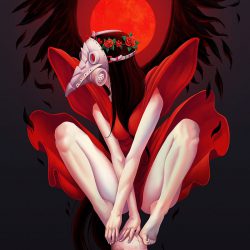
MANTAUA UNUI POEM DE DRAGOSTE / THE MANTLE OF A LOVE POEM
Despre ce-aș fi putut vorbi
în zilele acestei veri cu tine?O manta putrezită pe care poeții o îmbracă
de atâtea sute de ani,
– așa îmi par uneori cuvintele la sfârșit de mileniu.
Îmi privesc mama aplecată amețitor deasupra lucrului de mână
care ne asigură existența și știu cât de nemulțumită este de mine.
Ar fi vrut să mă apuc de o meserie practică,
să nu mai vânez himera care se lasă noaptea cu pui cu tot
în bucătăria noastră strâmtă, printre florile-mi de tei;
să nu mai întârzii prin cartier fericită
că am găsit expresie și epic
în amintirile unui invalid de război uitat pe o scară rulantă;
expresie și epic pe o stradă pavată cu pietre interbelice,
pătrate, negre, lucioase; într-un lac în care o fată cu păr lung
a aruncat pe la asfințit un inel de argint
și-a început o viață aproape la fel de lungă când plouă.
Ar vrea să nu mă mai chinuiesc inutil,
să devin o elegantă și o „ea”,
să uit,
să părăsesc felul ăsta de a-mi despica firul vieții în patru.Numai că această manta putrezită îmi este atât de largă
încât mă împiedic zilnic de dragă în ea.
Aici îmi cresc mie altfel de aripi secrete,
aici sunt eu pământ bun, iarbă verde, amețitoare, înaltă,pentru a stelelor fiară întunecată
din lumea cealaltă.Despre ce-aș fi putut vorbi
în zilele acestei veri cu tine?Mariana MARIN
…………………….
THE MANTLE OF A LOVE POEM
What could I have talked about
in the days of this summer with you?A rotten mantle that poets have been wearing
for so many hundreds of years
– that’s how the words sometimes seem to me at the end of the millennium.
I watch my mother headily bent over her handiwork
that provides our existence and I know how displeased she is with me.
She would have wanted me to take up a practical job,
to stop hunting the chimera that drops off at night with her chicks and everything
in our cramped kitchen, among my linden flowers;
to stop lingering around the neighborhood happy
to have found expression and epic
in the memories of a war invalid forgotten on an escalator;
expression and epic on a street paved with interwar stones,
square, black, glossy stones; in a lake where a long-haired girl
threw a silver ring at sunset
and she began a life almost as long as it rains.
She would like me to stop suffering unnecessarily,
to become an elegant and a “she”,
to forget,
to leave this way of splitting the thread of my life in four.It’s just that this rotten mantle is so wide for me
that I stumble every day for love in it.
Here grow me different secret wings,
here I am good earth, green, dizzying, tall grass,to the dark beast stars
of the other world path.What could I have talked about
in the days of this summer with you?
trad. M. M. Biela
ARIPA SECRETA / THE SECRET WING
POSTED IN Mariana June 14, 2023
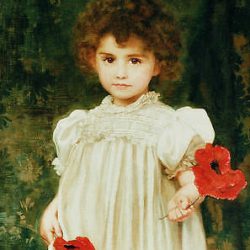
ARIPA SECRETA / THE SECRET WINGGânduri negre la capătul unui război de o sută de ani,
dar și speranța.
Botișorul ei umed – amintire celestă
din arțarul de lângă fereastră.
Oboseală, spaimă, îngrijorare
la capătul unui război de o sută de ani,
dar și zâmbetul fetiței noastre Anne.
Mersul ei ușor din aripa secretă în imaginație.
Felul în care ne-a unit.
Privește, ea acum se retrage,
noi rămânem.Deasupra, cerul.
Binele va învinge pentru încă o sută de ani.Mariana MARIN
…………………..
THE SECRET WING
Dark thoughts at the end of a hundred years’ war,
but also hope.
Her wet nose – heavenly memory
from the maple tree by the window.
Fatigue, fear, worry
at the end of a hundred years’ war,
but also the smile of our little girl Anne.
Her easy walk from the secret wing into the imagination.
The way it brought us together.
Look, she now withdraws,
we remain.Above, the sky.
Good will prevail for another hundred years.trad. M. M. Biela

Copyright © 2023 by Magdalena Biela. All rights reserved.